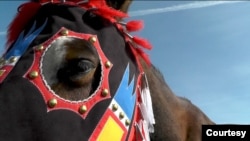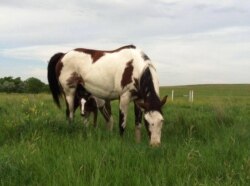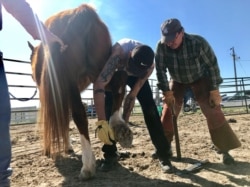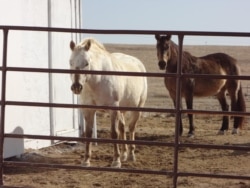It is a life-altering moment for a Native American child who has only known trauma: made to stand at the center of a corral, surrounded by galloping horses, his defenses dissolve, revealing the vulnerability he normally tries to conceal.
That’s when something almost magical happens: A single horse makes its way to the child.
“That one horse seems to sense the child that is just like him,” explains Greg Grey Cloud, a member of the Crow Nation who works in Sinte Gleska University’s Tiwahe Glu Kini Pi (SGU’s TGKP) (“Bringing the Family Back Together”) program.
“The child that he can work with, the one child he can trust the most," he said. "And from that time on, the horse and the relative are together, committing themselves to each other, trying to help one another overcome their fears.”
Grey Cloud is describing a ceremony he calls the Spirit Connection, one of the ways he uses traditional Lakota horse culture to help children with serious emotional and behavioral disturbances on Rosebud, the South Dakota reservation that is home to the Sicangu Oyate, one of the seven tribes of the Lakota Nation.
Poverty and unemployment run high on Rosebud. Many families struggle with the basics of food, transportation and medical care. Drug use and alcoholism are common, and in this environment, youth are at risk for alcohol and substance abuse, mental health issues, and violence.
“Oftentimes, these kids don’t get to experience much love or attention in their homes, communities or schools,” said Grey Cloud. “But they get it from the horses. And working with the horses, they learn boundaries, they learn Lakota values, how to show them, how to receive them.”
The experience, said Grey Cloud, can be transformative.
“We’ve had relatives who when they first come in, they hide their faces and don’t talk at all,” he said.
Then he laughs.
“Now we can’t get them to be quiet!”
Some of the relatives go on to learn how to handle and train horses or perform the myriad of tasks necessary on a working ranch: fence mending, grooming, weeding and mowing. And some end up working for the program themselves.
Total care
Horse therapy is just one service offered in SGU’s TGKP program, which director Marlies White Hat describes as a total system of care.
“The program began more than a decade ago with a small grant from the Robert Wood Johnson Foundation,” she said. “The major purpose was to improve the lives of tribal youth with substance abuse problems and those who were involved with the juvenile justice system."
At the time, with few mental health services available, troubled children more often than not, ended up in juvenile detention, she explained. Others succumbed to an epidemic of suicide that hit Rosebud in the early 2000s.
Today, with funding from the U.S. Department of Health and Human Services' Substance Abuse and Mental Health Services Administration (SAMHSA), SGU’s TGKP provides services to about 60 children.
“Children can be self-referred or referred to us by relatives, caregivers, schools, the justice system, or social services,” White Hat said. “The child and family choose what services they want.”
Those services include individual and family counseling, substance abuse treatment and prevention, and referrals to outside programs.
Equine therapy, she said, is one of the most popular services offered.
“Children would so much rather talk to a horse than a counselor at a desk,” she said.
The program also has access to SAMHSA flex funds to help families with occasional emergency needs.
“When we started the program, we were very reluctant to pay a family’s electric bill or provide propane for heat because there is so much dependency here,” she said. “But what we found was that if we were able to help a family with a particular need, then that family could move forward and bring their child in for mental health services.”
Both Grey Cloud and White Hat acknowledge that the work can be exhausting.
“And emotionally draining,” said Grey Cloud, “because I used to be a boy just like them and I needed a friend just like they do.”
But the work is also rewarding.
“You get to see these young kids learn that they really are in control of what happens around them,” he said.











